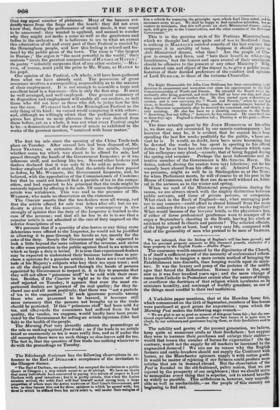The Right Honourable Sir Jan Cam Hobhouse has been unremitting
in hi' devotion to amusement and recreation ever since his appointment to the First Commissionership of Woods and Forests. He attended the Board twice is- niediately after being gazetted, and staid there half an boor one day, and about three quarters of an hour another day. He then started upon a shooting ex- cursion, and is now surveying the " Woods and Forests," when he can find them, in Scotland. Admiral Fleming, another new appointment, hoisted hi, flag at Sheerness immediately after be received the command, and struck it the next morning. lie also has been on a shooting excursion to the North, " Scotching, but not killing :" however, he has returned. He came back two or three days ago. England is therefore safe ; Fleming is at his post.-31Jrn- lug Post.
The time actually spent by Sir JOHN HOBHOUSE at his office is, we dare say, not overstated by our caustic contemporary : but however that may be, it is evident that lie cannot hale been spending the last few weeks profitably for the public, w hose ser- vant he is. It would, no doubt, have been more becoming had he devoted the weeks he has spent in sporting to his official duties; for he at least has not the excuse for absence which some of his colleagues may plead,—namely, that of being fagged during the spring and summer. Perhaps the most industrious and at- tentive member of the Government is Mr. SPRING RICE. His duties, indeed, during the session were very laborious ; yet he has scarcely been absent from his office at all. Admiral FLE71IING, we presume, might as well be in Stirlingshire as at the Nom.; for when Parliament meets, be will of course be at his post in the House of Commons, and the fleet can do as well without an Admi- ral in the autumn as in the winter and spring.
When we read of the Ministerial peregrinations during the recess, we are always struck with the mighty distinction between public servants, and those of private persons, or companies. What cleik in the Bank of England—nay, what managing port- lier in any concern—could afford to absent himself from the scene of his ordinary duties year after year for several weeks together? What would become of the lawyers' briefs, or the physician's fees, if either of these professional gentleman were to scamper off to enjoy a September's shooting in the North, leaving his clerk or assistant to attend fo clients and patients ? The salaried officials, of the higher grade at least, lead a very easy life, compared with that of the generality of men who pretend to be men of business.
















 Previous page
Previous page